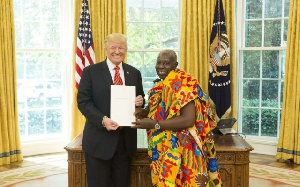The governments of Ghana and the United States of America (USA) have come to a compromise in their efforts to deport undocumented Ghanaian immigrants.
This follows the U.S. government’s concern that the government of Ghana was not complying with international obligations regarding the issuance of travel documents to Ghanaians awaiting deportation.
The U.S. Embassy in Accra followed up with a statement saying the U.S. will be forced to begin implementing a visa restrictions regime in accordance with their laws as a responsibility owed to the American people if the government of Ghana did not play ball.
Ghana’s Ambassador to the U.S.A., Dr Baffour Adjei Bawuah told Class91.3FM’s Moro Awudu on the sidelines of the 73rd UN General Assembly on Monday, 24 September 2018 in New York that both governments have reached an agreement.
“What unfortunately turned out to be some kind of a tussle was the fact that the [Ghanaian] Embassy was having a difficulty just endorsing, as it were, a documentation when the embassy wouldn’t even have a basic information about the people who are being deported.”
He said: “It was quite unfortunate Ghanaian citizens with all the encouragement we are giving them don’t register with the embassies even though the passport says that whenever you travel, register with the nearest embassy.
“So, if we are asked to sign up to documentation to have them deported, in fairness to everybody, there ought to be a significant assumption that the embassy accepts that the person is a Ghanaian, the embassy understands that there has been an infraction of the law and the embassy understands that whatever the process was, was fair on the Ghanaian.
“But we are not in a position to testify to the fact that the Ghanaian had an infringement, the due process was applied to the person and, therefore, the person in fairness to America could be deported.
“We were not in the court when the proceedings were going on, so, we cannot testify to the fairness of the law…so to just be given names and asking for proper documentation for them to be deported was a bit tough for any embassy…
“If the person came in on an accepted documentation at the port of entry, there ought to be the documentation that allowed the person to be brought in. So, whatever basic information that was necessary, the American system should have it, so, if they do have it then they don’t have to come to us to ask if the person is Ghanaian…
“So, all we were talking about was for a certain fairness to be applied and the embassy, not necessarily pressured to agree to see some people deported, and this is where we had a certain difference of opinion but we have had enough discussions for a certain kind of sanity to prevail.
“I can, at least, confirm that we do have a certain kind of understanding on the process and we don’t have any tension with America anymore.”
General News of Tuesday, 25 September 2018
Source: classfmonline.com













